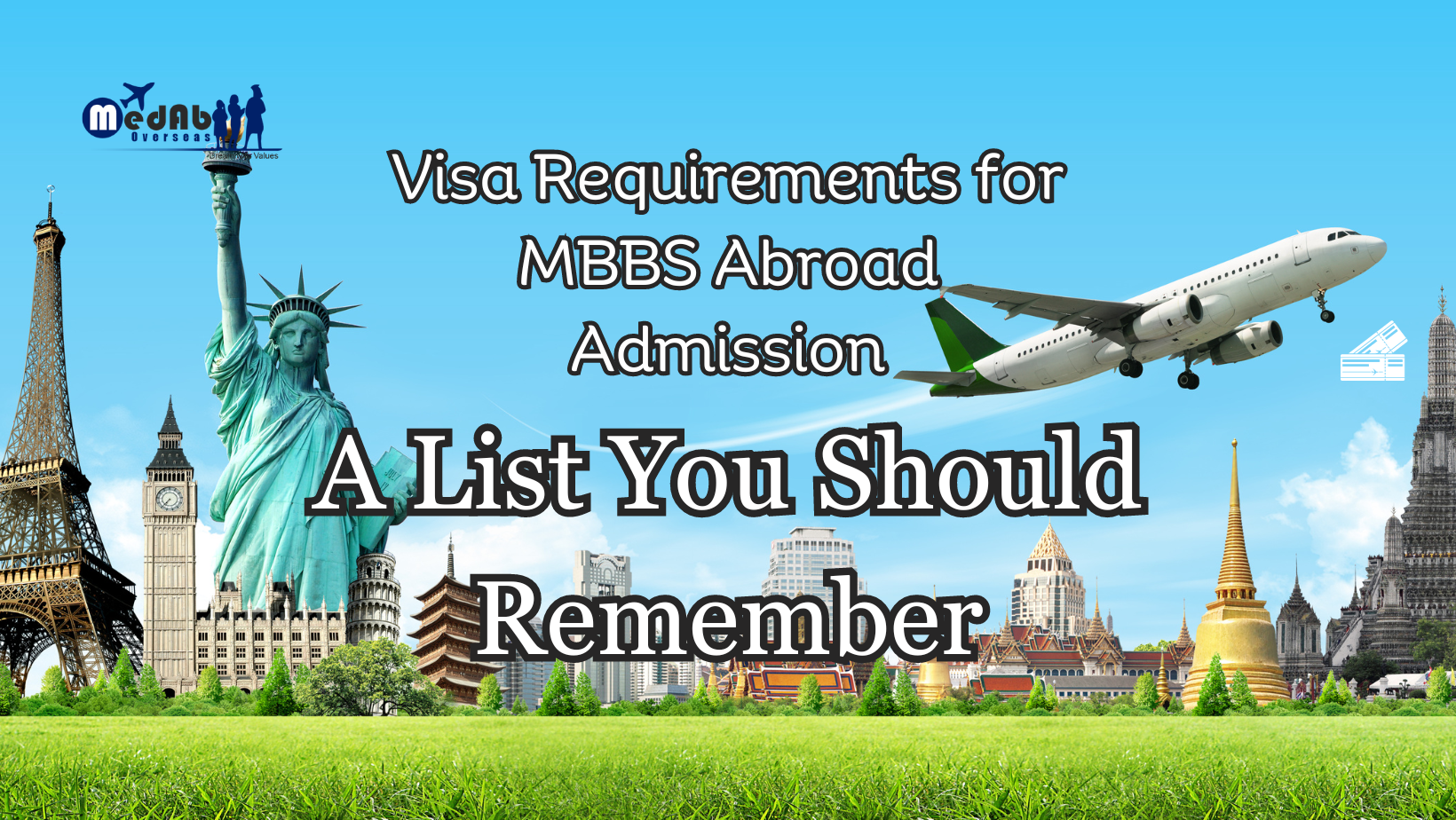Visa Requirements for MBBS Abroad Admission: A List You Should Remember
Studying medicine abroad is a dream for many aspiring doctors, offering not only a world-class education but also an opportunity to experience diverse cultures and healthcare systems. However, before you can embark on this exciting journey, you must navigate the complex landscape of visa requirements.
In this blog post, we will break down the crucial aspects of visa requirements for MBBS abroad admission, helping you understand the steps and documentation necessary to make your dream of studying medicine in a foreign country a reality.
1. Know Your Destination:
The visa requirements for studying MBBS abroad can vary significantly depending on your chosen destination. Different countries have distinct visa categories and processes. Therefore, the first step is to research and identify the country where you plan to pursue your medical degree. Once you’ve selected your destination, you can then delve into the specific visa requirements for that country.
2. Student Visa:
In most cases, you will need a student visa to study MBBS abroad. This visa category is for international students and typically allows them to remain in the country until they complete their education. To apply for a student visa, you will need an acceptance letter from the university to which you have been admitted. This letter is proof of your registration and is an important part of your visa application.
3. Admission Letter:
As mentioned earlier, you’ll require an admission letter from the university to apply for a student visa. To obtain this letter, you must meet the academic and language proficiency requirements of the university. Ensure that you have a clear understanding of the university’s admission process and the documents they require for issuing the acceptance letter.
4. Financial Proof:
One of the key requirements for a student visa is demonstrating your financial capacity to cover the cost of your education and living expenses in the host country. This proof often involves providing bank statements, scholarship letters, or a financial guarantee from a sponsor. The exact amount required can vary, so check with the embassy or consulate of your chosen country for specific details.
5. Visa Application Form:
Every country will have a specific visa application form that you must complete and this form is usually available on the official website of the country’s embassy or consulate. So, Ensure that you fill out the form accurately and provide all the requested information and be sure to review the specific requirements for the visa application form for your chosen country. Some countries may also require additional forms or supplementary documents.
6. Passport and Photographs:
You’ll need valid passport with minimum of six months’ validity beyond your intended stay in the country. Additionally, you’ll require passport-sized photographs meeting the specifications set by embassy or consulate because it’s essential to take these specifications seriously, as even minor deviations can lead to delays in processing your visa application.
7. Health and Travel Insurance:
Many countries require international students to have health and travel insurance coverage for duration of their stay. So, be prepared to provide evidence of such insurance along with visa application and check with your chosen university and the embassy or consulate for guidance on the specific insurance requirements.
8. Medical Examination:
Some countries also require a medical examination to ensure you are in good health and don’t pose a health risk to their citizens. This includes a check for infectious diseases.
The process and requirements for this examination can vary, so be sure to check with relevant authorities. Remember to schedule this examination well in advance of your visa application, as the results may take some time to process.
9. Language Proficiency:
In countries where the primary language is not your native language, you might need to prove your language proficiency. This involves taking a language proficiency test like IELTS or TOEFL and submitting your scores as part of your visa application. Ensure you meet the minimum score requirements set by your chosen university and immigration authorities of host country.
10. Visa Interview:
In some cases, you may be required to attend a visa interview at an embassy or consulate. This interview provides an opportunity for the authorities to assess your intentions and suitability for a student visa. Be prepared to answer questions about your degree program, future plans, and education funding options.
Review common visa interview questions, prepare clear and concise answers, and practice interviewing. It’s also important to keep all supporting documents organized and easily accessible during the interview.
11. Visa Fee:
There is usually a fee for applying for a visa. Amounts may vary significantly. So be sure to check the costs and accepted payment methods. Please visit your embassy or consulate website for the latest fee information and payment instructions.
12. Visa Processing Time:
Visa processing times may vary. It is important to apply for your student visa well in advance of your scheduled start date to allow enough time to complete the process. Please be aware of any specific deadlines or requirements of your embassy or consulate. If available, you may also choose expedited processing services, especially if your program starts quickly.
13. Visa Validity and Renewal:
Please consider the validity period of your student visa. Some visas are issued for the duration of the program, while others require an extension after a certain period of time. Be aware of the renewal process and visa extension requirements. It is important to meet visa renewal deadlines and maintain your legal status.
Conclusion:
Studying MBBS abroad can be a life-changing experience, but understanding and meeting visa requirements is a key factor in making this dream a reality. Start early to be prepared and seek advice from your desired university and the embassy or consulate of your destination country.
Therefore, the most accurate and up-to-date information can always be found on the official website of the respective embassy or consulate. By following these steps and staying updated, you can make your dream of studying MBBS abroad a reality. This is more than just an educational trip. This is your chance to expand your horizons and become a globally competent medical professional.
A Word From Us:
At MedAb Overseas, we understand the importance of finding the right medical program to advance your career in the field of medicine. That’s why we offer comprehensive MBBS abroad consultancy services to help students like you find the best universities and programs to study MBBS abroad.
Whether you’re an Indian student looking to study MBBS in foreign universities or you’re interested in finding the top medical colleges abroad, we have the expertise and resources to help you achieve your goals. Our team will assist you in researching and comparing the best medical colleges and universities abroad, as well as provide guidance on the MBBS abroad fees and admission processes.
With our help, you can be confident that you’re making an informed decision and choosing the best path to achieve your dreams of a career in medicine. So if you’re looking to study MBBS abroad and want to work with the best MBBS consultancy, visit MedAb Overseas today and let us help you on your journey!
Want to study MBBS in abroad? Connect with us at: https://www.medaboverseas.com/contact/
Checkout our YouTube channel: https://www.youtube.com/@medaboverseas
Get latest updates on our Instagram: https://www.instagram.com/medaboverseas/




